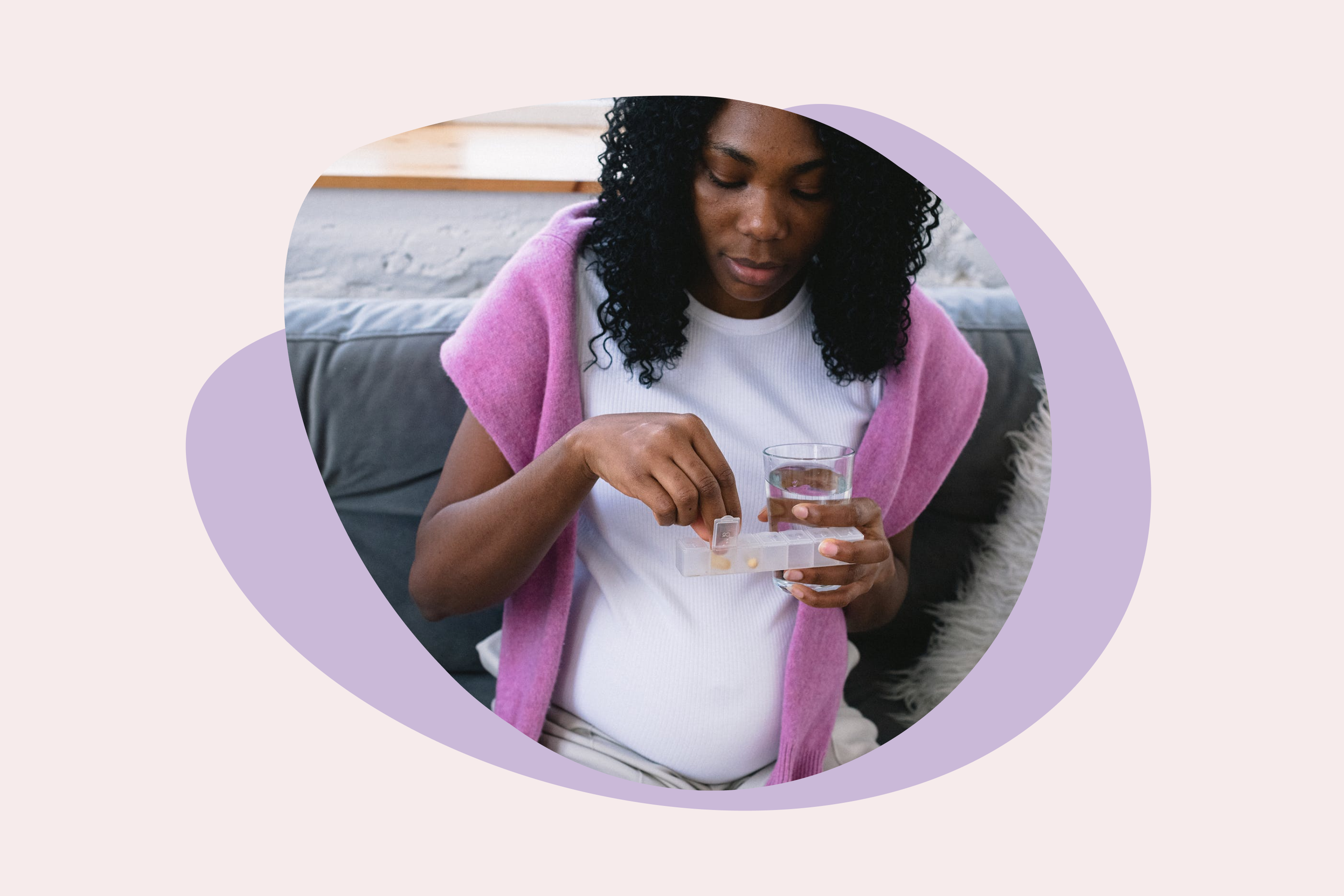10 Benefits of Prenatal Supplements for Pregnancy [TTC Guide]

Prenatal vitamins – we know we need to take them when trying to conceive (TTC), but why?
In this article, we’ll cover everything you need to know about the key ingredients inside a prenatal vitamin, how they set your pregnancy up for success, and when you should start taking them. We’ll also follow this up with some of your most frequently asked questions – let’s go!
What do prenatal supplements do?
Prenatal vitamins are a type of supplement designed for individuals who are pregnant, trying to become pregnant, or could potentially become pregnant. Their purpose is to provide expecting mothers with a boost of nutrients to promote healthy fetal development, which in turn lowers the risk of birth defects and complications. They work the best when taken regularly in conjunction with a healthy diet that is already rich in fruits, vegetables, whole grains, protein, and healthy fats.
What are the best prenatal supplements?
When shopping for a prenatal vitamin, it’s a good idea to double-check that it has the following key ingredients: folic acid, calcium, and iron. In addition to this, you may also want to look for other ingredients like vitamin D, vitamin C, vitamin E, thiamin, riboflavin, and zinc.
Also, make sure to select supplements made by experts. Mira’s Prenatal Supplements (100% organic, Vegan & Gluten-free, with 20 vitamins in one capsule) was created by in-house OB/GYNs with years of experience in supporting fertility journeys and those trying to conceive. They are perfect for boosting reproductive health, balancing hormones, increasing the pregnancy success rate, and lowering the risk of ovulatory infertility.
If you are unsure about what prenatal vitamins and additional supplements to take while TTC, speak with your doctor or a fertility coach, and they can provide you with the best advice for your situation.
10 benefits of prenatal vitamins
Prevents neural tube defects (folic acid)
Neural tube defects (also known as NTDs) can lead to anencephaly or spina bifida, which can cause serious birth defects, physical disabilities, and even death. To prevent this from happening, research shows that folic acid can help. It’s common for prenatal vitamins to contain around 400 mcg of folic acid and many contain up to 600 mcg, which is the dose commonly recommended during pregnancy.
Protects mother’s bones (calcium)
The changes that the body undergoes during pregnancy can put a lot of strain on the mother’s bones, which causes the body to require more calcium than normal. Not only that, but extra calcium is also needed to support the skeletal development of a growing fetus.
Supports development of placenta and fetus (iron)
During pregnancy, red blood cells are essential for transporting oxygen to your organs, tissues, placenta, and fetus so that they can thrive. Hemoglobin is a key molecule that helps the body transport this oxygen, and red blood cells require extra iron to help build a component of hemoglobin.
Prevents anemia for mother (iron)
Because the body requires so many red blood cells to sustain a pregnancy, it is common for some pregnant individuals’ red blood cell levels to be low. This is called anemia, and it can make you feel fatigued, tired, and low on energy. In severe cases, anemia can also increase your risk of premature birth. Iron is a mineral that can help to restore red blood cell levels and reduce this risk.

Reduced risk of birth defects (folic acid)
In addition to preventing birth defects related to neural tube development (i.e. anencephaly and spina bifida), research also shows that folic acid can help reduce the risk of other birth defects as well. This includes life-threatening congenital heart defects and oral clefts.
Helps brain and eye development (DHA and ARA)
DHA (docosahexaenoic acid) and ARA (arachidonic acid) are critical for your baby’s cognitive and visual development during pregnancy. DHA is an omega-3 fatty acid, while ARA is an omega-6 fatty acid. In addition to supporting fetal development, some research also suggests that DHA may help to ease symptoms of depression during late pregnancy and the postpartum period.
Reduce the risk of preeclampsia (folic acid)
Doctors are still uncertain about the specific cause of preeclampsia. However, many believe that it may be caused by elevated blood homocysteine levels, which can affect the blood supply to the placenta. Folic acid is thought to help lower blood homocysteine levels, which may help to prevent preeclampsia.
Reduce risk of low birth weight (iron)
The body requires approximately 3X more iron during pregnancy than it did prior to pregnancy. This is because iron plays such a key role in the production of red blood cells and fetal growth. When iron levels are low, research shows that the risk of low birth weight increases.
Reduced risk of gestational diabetes (Vitamin D)
When diabetes develops during pregnancy, this can increase a number of risks including the risk of high blood pressure, high birth weight, and premature delivery. One factor that is associated with an increased risk of gestational diabetes is vitamin D deficiency, which is why many prenatal supplements contain vitamin D.
Reduced risk of rickets (Vitamin D)
Vitamin D deficiency is also associated with an increased risk of rickets. Rickets is a condition that prevents bone development, and in some cases can cause bone deformities.
3 vital prenatal vitamin ingredients
Folic acid
Folic acid is a key ingredient that supports fetal growth and development. In turn, it helps to prevent neural tube defects, congenital heart defects, and oral clefts while also reducing the risk of preeclampsia.
Calcium
Calcium helps to strengthen and develop a baby’s skeletal system. It also supports the mother’s bone health as their body changes through pregnancy.
Iron
Iron is essential for ensuring the body has enough red blood cells to support the development of the placenta and fetus. It also helps to prevent low birth weight, preterm birth, and anemia.
Getting the most benefit from your prenatal vitamins
When should you take prenatal vitamins?
If you are thinking about planning a pregnancy, it’s a good idea to start taking a daily prenatal vitamin at least three months before trying. This will ensure that your body has enough nutrients to support early fetal development while also reducing the risk of birth defects.
It’s also worth considering taking a prenatal vitamin if there is a chance you could become pregnant, but you are not actively TTC. This will help to protect yourself and your baby in the event of an unplanned pregnancy.

What are the side effects of prenatal vitamins?
Some of the vitamins and minerals found in prenatal vitamins can cause some side effects. Here are the most common:
- Loss of appetite
- Upset stomach
- Nausea
- Bloating
- Constipation
The best way to limit these side effects is to never take your prenatal vitamin on an empty stomach and try to take it at the same time each day.
Prenatal vitamins FAQ
Can prenatal vitamins make you gain weight?
No. There is no evidence that suggests prenatal vitamins can make you gain weight. Remember – a vitamin cannot be used to hide an unhealthy lifestyle. The only way to maintain a healthy weight while taking a prenatal vitamin is to eat a well-balanced diet, exercise regularly, and keep your stress levels to a minimum.
For more information on how to maintain a healthy lifestyle while TTC, check out our articles Pre-Pregnancy Diet: What Foods Should You Be Eating When TTC? and 5 Pre Pregnancy Workouts: How to Prepare Your Body when TTC.
Will prenatals also help my hair grow?
Many people have claimed over the years that prenatal vitamins have helped their hair and nails grow. While this may be true for some, there is no medical evidence that supports this claim. Vitamins do however support your overall health, which can of course have a positive effect on things like your hair, nails, and skin.
Is it better to take prenatal pills in the morning or night?
It does not matter what time of day that you take a prenatal pill, as long as you take it each day. The most important thing is to take it at a time when you are the least likely to experience some of the negative side effects like nausea and abdominal discomfort. For some, this will be in the morning after breakfast, but for others, this may be in the late evening after dinner.
The best thing to do when starting a new prenatal vitamin is to try to stay aware of your body and how the pill makes you feel. You can then make adjustments to your routine if you notice that it upsets your stomach at certain times of the day.
Mira’s Editorial Process
All content produced by Mira meets stringent editorial standards, ensuring excellence and accuracy in language and medical precision. Every piece undergoes thorough fact-checking and review by qualified professionals. Check out our full editorial process to learn more.










